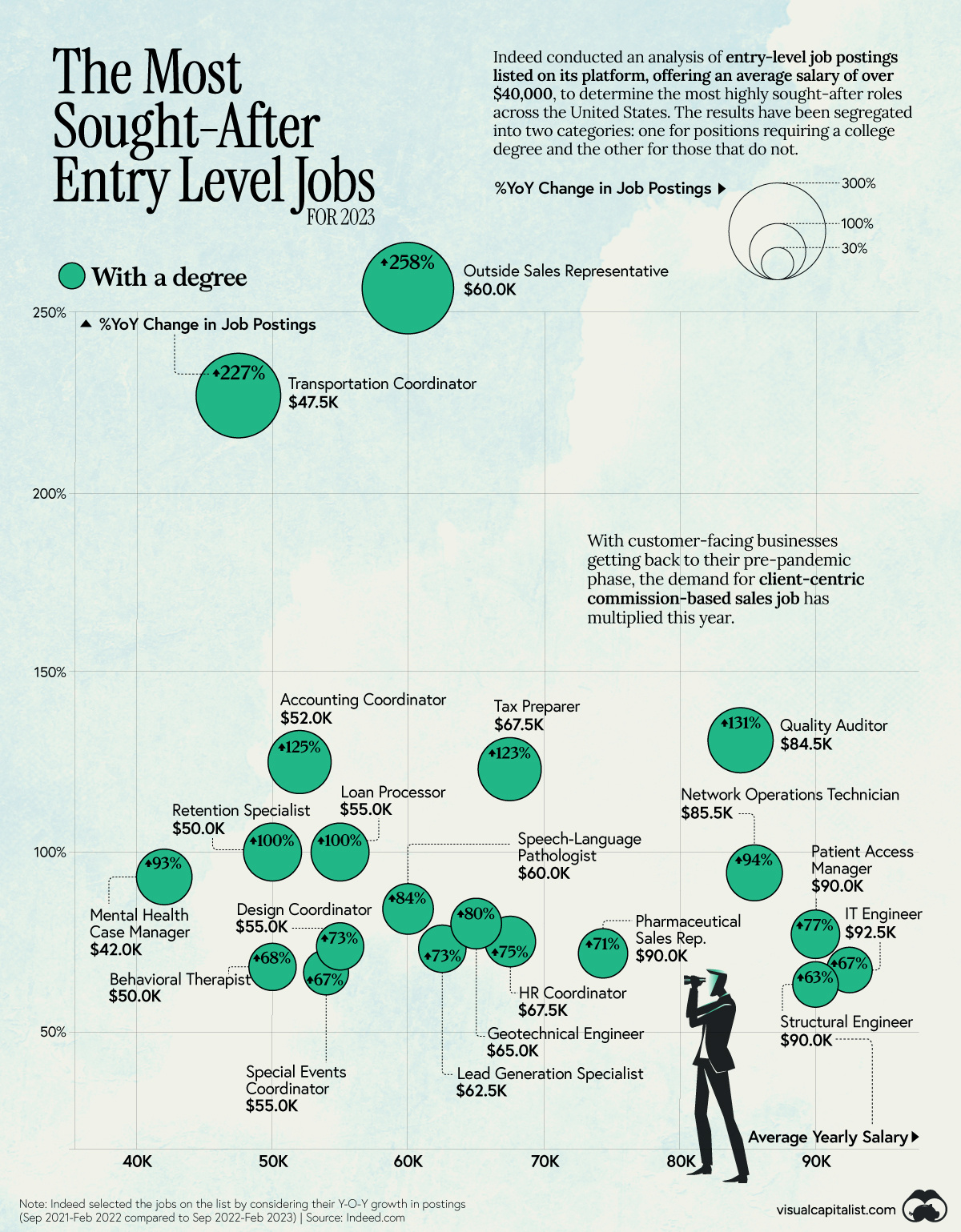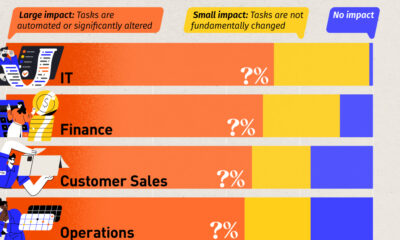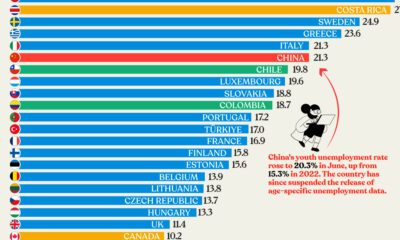Markets
Visualizing the Most Sought-After Entry Level Jobs in 2023
The following slider shows information for jobs with degree requirements without degree requirements. Use slider arrows to navigate.
The Most Sought-After Entry Level Jobs of 2023
In the fast-paced realm of job hunting, staying ahead of the curve is crucial. And if you are an entry-level job applicant, the pressure is a notch higher.
New entrants in any job market today compete with groundbreaking technology like ChatGPT in addition to their peers. In the United States, these applicants have to also wade through an uncertain labor market, inflation, and long lists of job requirements.
Indeed.com has identified the most sought-after entry level positions for applicants both with and without a degree in the U.S., and the year-on-year growth of these job postings.
Most Sought-After Entry-Level Jobs With a Degree
As the U.S. job market recovers from its pandemic slump, some careers are now booming. This in turn has opened up numerous opportunities for entry-level job applicants.
| Rank | Job Title | Average Annual Salary | Change in Postings (2022‒2023) |
|---|---|---|---|
| 1 | Outside Sales Representative | $60,000 | +258% |
| 2 | Transportation Coordinator | $47,500 | +227% |
| 3 | Quality Auditor | $84,500 | +131% |
| 4 | Accounting | $52,000 | +125% |
| 5 | Tax Preparer | $67,500 | +123% |
| 6 | Loan Processor | $55,000 | +100% |
| 7 | Retention Specialist | $50,000 | +100% |
| 8 | Network Operations Technician | $85,500 | +94% |
| 9 | Mental Health Manager | $42,000 | +93% |
| 10 | Speech-Language Pathologist | $60,000 | +84% |
| 11 | Geotechnical Engineer | $65,000 | +80% |
| 12 | Patient Access Manager | $90,000 | +77% |
| 13 | HR Coordinator | $67,500 | +75% |
| 14 | Lead Generation Specialist | $62,500 | +73% |
| 15 | Design Coordinator | $55,000 | +73% |
| 16 | Pharmaceutical Sales Representative | $74,378 | +71% |
| 17 | Behavioral Therapist | $50,000 | +68% |
| 18 | Special Events Coordinator | $54,000 | +67% |
| 19 | IT Engineer | $92,500 | +67% |
| 20 | Structural Engineer | $90,000 | +63% |
The demand for sales jobs multiplied this year as customer-facing businesses slowly returned to their pre-pandemic levels.
At the top of this list is the job for an Outside Sales Representative. Paying upwards of $60,000, postings for this job have grown by over 250% in a year, making it the most sought-after position for applicants with a degree.
The healthcare industry has secured its place in the top ranks too. Careers including mental health case managers, speech pathologists, behavioral therapists, and patient access managers dominate the Top 20 list.
Let’s not forget about the tech sector. While entry-level network technicians can earn upwards of $85,000 on average, while IT engineers are paid an entry package of over $90,000.
Most Sought-After Entry-Level Jobs Without a Degree
Nearly 65% of the U.S. working population does not have a four-year degree. However, millions of these workers continue to be highly skilled across professions and have a shot at some of the most sought-after entry level jobs in the country.
| Rank | Job Title | Average Annual Salary | Change in Postings (2022‒2023) |
|---|---|---|---|
| 1 | Inventory Manager | $59,000 | +189% |
| 2 | Auto Body Technician | $82,500 | +100% |
| 3 | Environmental Health and Safety Specialist | $65,000 | +100% |
| 4 | Salon Manager | $41,000 | +95% |
| 5 | Drafting Technician | $50,000 | +94% |
| 6 | Business Analyst | $72,500 | +82% |
| 7 | Sheet Metal Mechanic | $62,140 | +67% |
| 8 | Aircraft Maintenance Technician | $57,500 | +64% |
| 9 | Catering Manager | $47,500 | +56% |
| 10 | Transportation/Logistics Coordinator | $62,500 | +53% |
| 11 | Route Sales Representative | $50,000 | +51% |
| 12 | Rental Agent | $45,520 | +50% |
| 13 | Distribution Center Coordinator | $52,500 | +47% |
| 14 | General Maintenance Technician | $40,650 | +46% |
| 15 | Patient Care Coordinator | $43,152 | +44% |
| 16 | Forestry Technician | $45,760 | +43% |
| 17 | Relationship Banker | $43,576 | +43% |
| 18 | Field Sales Representative | $57,018 | +42% |
| 19 | Park Ranger | $45,912 | +42% |
| 20 | Warehouse Receiver | $45,000 | +39% |
One example of this job is that of an Inventory Manager. The demand for skilled inventory managers in warehouses and companies post-pandemic has doubled the position’s job share in a year.
One of the highest paying non-degree jobs in this list—Auto Body Technician—can fetch highly-skilled entry-level workers a salary of $82,000 per year.
These jobs don’t seem to require a degree according to Indeed. However, the rising competition for these positions might give the upper edge to applicants with one, especially for jobs on the list such as Business Analyst and Relationship Banker.
Markets
The European Stock Market: Attractive Valuations Offer Opportunities
On average, the European stock market has valuations that are nearly 50% lower than U.S. valuations. But how can you access the market?
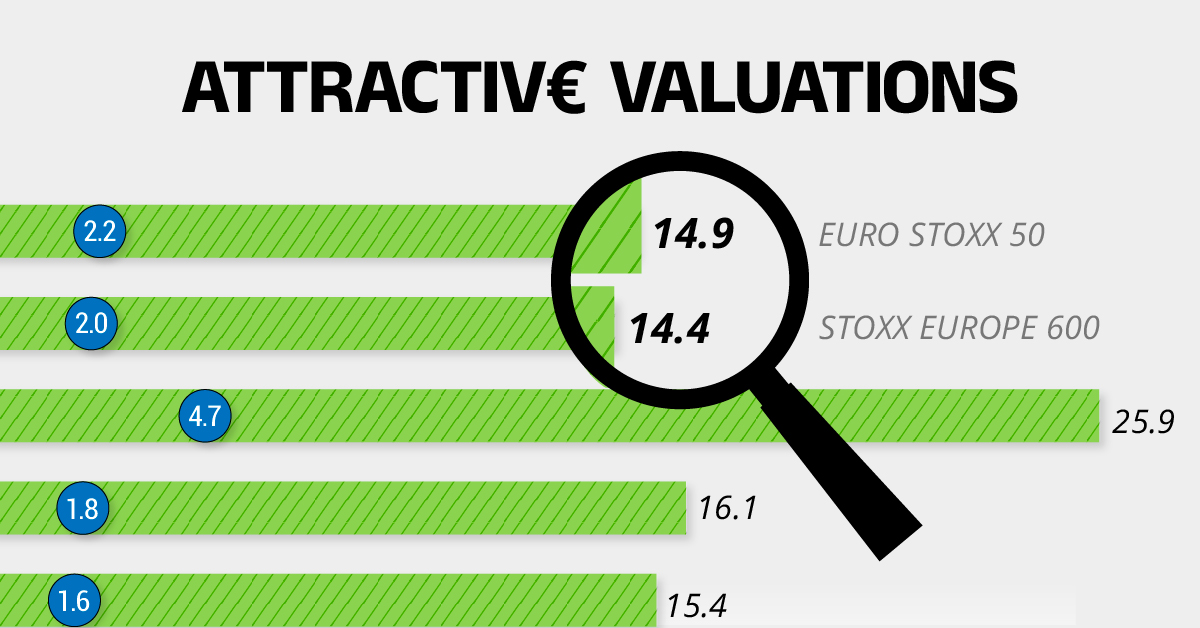
European Stock Market: Attractive Valuations Offer Opportunities
Europe is known for some established brands, from L’Oréal to Louis Vuitton. However, the European stock market offers additional opportunities that may be lesser known.
The above infographic, sponsored by STOXX, outlines why investors may want to consider European stocks.
Attractive Valuations
Compared to most North American and Asian markets, European stocks offer lower or comparable valuations.
| Index | Price-to-Earnings Ratio | Price-to-Book Ratio |
|---|---|---|
| EURO STOXX 50 | 14.9 | 2.2 |
| STOXX Europe 600 | 14.4 | 2 |
| U.S. | 25.9 | 4.7 |
| Canada | 16.1 | 1.8 |
| Japan | 15.4 | 1.6 |
| Asia Pacific ex. China | 17.1 | 1.8 |
Data as of February 29, 2024. See graphic for full index names. Ratios based on trailing 12 month financials. The price to earnings ratio excludes companies with negative earnings.
On average, European valuations are nearly 50% lower than U.S. valuations, potentially offering an affordable entry point for investors.
Research also shows that lower price ratios have historically led to higher long-term returns.
Market Movements Not Closely Connected
Over the last decade, the European stock market had low-to-moderate correlation with North American and Asian equities.
The below chart shows correlations from February 2014 to February 2024. A value closer to zero indicates low correlation, while a value of one would indicate that two regions are moving in perfect unison.
| EURO STOXX 50 | STOXX EUROPE 600 | U.S. | Canada | Japan | Asia Pacific ex. China |
|
|---|---|---|---|---|---|---|
| EURO STOXX 50 | 1.00 | 0.97 | 0.55 | 0.67 | 0.24 | 0.43 |
| STOXX EUROPE 600 | 1.00 | 0.56 | 0.71 | 0.28 | 0.48 | |
| U.S. | 1.00 | 0.73 | 0.12 | 0.25 | ||
| Canada | 1.00 | 0.22 | 0.40 | |||
| Japan | 1.00 | 0.88 | ||||
| Asia Pacific ex. China | 1.00 |
Data is based on daily USD returns.
European equities had relatively independent market movements from North American and Asian markets. One contributing factor could be the differing sector weights in each market. For instance, technology makes up a quarter of the U.S. market, but health care and industrials dominate the broader European market.
Ultimately, European equities can enhance portfolio diversification and have the potential to mitigate risk for investors.
Tracking the Market
For investors interested in European equities, STOXX offers a variety of flagship indices:
| Index | Description | Market Cap |
|---|---|---|
| STOXX Europe 600 | Pan-regional, broad market | €10.5T |
| STOXX Developed Europe | Pan-regional, broad-market | €9.9T |
| STOXX Europe 600 ESG-X | Pan-regional, broad market, sustainability focus | €9.7T |
| STOXX Europe 50 | Pan-regional, blue-chip | €5.1T |
| EURO STOXX 50 | Eurozone, blue-chip | €3.5T |
Data is as of February 29, 2024. Market cap is free float, which represents the shares that are readily available for public trading on stock exchanges.
The EURO STOXX 50 tracks the Eurozone’s biggest and most traded companies. It also underlies one of the world’s largest ranges of ETFs and mutual funds. As of November 2023, there were €27.3 billion in ETFs and €23.5B in mutual fund assets under management tracking the index.
“For the past 25 years, the EURO STOXX 50 has served as an accurate, reliable and tradable representation of the Eurozone equity market.”
— Axel Lomholt, General Manager at STOXX
Partnering with STOXX to Track the European Stock Market
Are you interested in European equities? STOXX can be a valuable partner:
- Comprehensive, liquid and investable ecosystem
- European heritage, global reach
- Highly sophisticated customization capabilities
- Open architecture approach to using data
- Close partnerships with clients
- Part of ISS STOXX and Deutsche Börse Group
With a full suite of indices, STOXX can help you benchmark against the European stock market.

Learn how STOXX’s European indices offer liquid and effective market access.

-
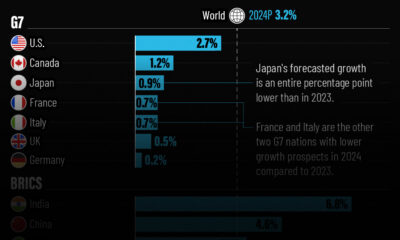
 Economy2 days ago
Economy2 days agoEconomic Growth Forecasts for G7 and BRICS Countries in 2024
The IMF has released its economic growth forecasts for 2024. How do the G7 and BRICS countries compare?
-
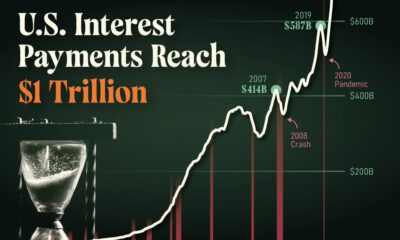
 Markets1 week ago
Markets1 week agoU.S. Debt Interest Payments Reach $1 Trillion
U.S. debt interest payments have surged past the $1 trillion dollar mark, amid high interest rates and an ever-expanding debt burden.
-

 United States2 weeks ago
United States2 weeks agoRanked: The Largest U.S. Corporations by Number of Employees
We visualized the top U.S. companies by employees, revealing the massive scale of retailers like Walmart, Target, and Home Depot.
-

 Markets2 weeks ago
Markets2 weeks agoThe Top 10 States by Real GDP Growth in 2023
This graphic shows the states with the highest real GDP growth rate in 2023, largely propelled by the oil and gas boom.
-

 Markets2 weeks ago
Markets2 weeks agoRanked: The World’s Top Flight Routes, by Revenue
In this graphic, we show the highest earning flight routes globally as air travel continued to rebound in 2023.
-

 Markets2 weeks ago
Markets2 weeks agoRanked: The Most Valuable Housing Markets in America
The U.S. residential real estate market is worth a staggering $47.5 trillion. Here are the most valuable housing markets in the country.
-
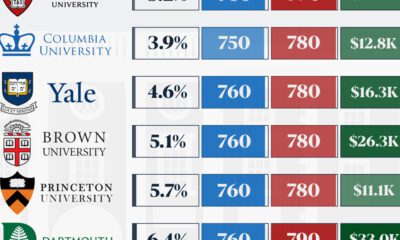
 Misc1 week ago
Misc1 week agoHow Hard Is It to Get Into an Ivy League School?
-

 Technology2 weeks ago
Technology2 weeks agoRanked: Semiconductor Companies by Industry Revenue Share
-

 Markets2 weeks ago
Markets2 weeks agoRanked: The World’s Top Flight Routes, by Revenue
-

 Countries2 weeks ago
Countries2 weeks agoPopulation Projections: The World’s 6 Largest Countries in 2075
-

 Markets2 weeks ago
Markets2 weeks agoThe Top 10 States by Real GDP Growth in 2023
-

 Demographics2 weeks ago
Demographics2 weeks agoThe Smallest Gender Wage Gaps in OECD Countries
-

 United States2 weeks ago
United States2 weeks agoWhere U.S. Inflation Hit the Hardest in March 2024
-

 Environment2 weeks ago
Environment2 weeks agoTop Countries By Forest Growth Since 2001
